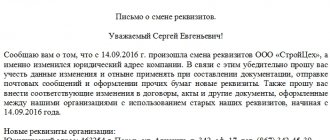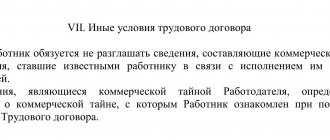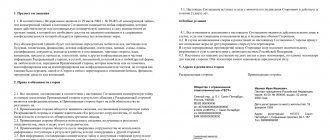Trade secrets and confidential information, unlike other types of information with limited access, have many common features. How these concepts coincide and differ, we will explain in our material.
Concept of confidential information
Explanation of the term “trade secret”
Similarity of confidential information with information constituting a trade secret
The main difference between confidential information and secret commercial information
Additional distinguishing feature of confidential and sensitive business information
Regulations on trade secrets at an enterprise and work with confidential documents
Results
Concept of confidential information
The definition of “confidential information” can be found in several regulations (for example):
1. According to Art. 2 of the Law “On Information, Information Technologies and Information Protection” dated July 27, 2006 No. 149-FZ - this is certain information that is not subject to transfer and distribution by the person who has access to it without the consent of its owner.
2. According to clause 2 of the Regulations for the exchange of electronic documents, approved by order of the Federal Tax Service of Russia dated December 12, 2006 No. SAE-Z [email protected] , this is information requiring protection, access to which is limited in accordance with:
- current legislation of the Russian Federation;
- by these Regulations.
3. According to Art. 2 of the no longer valid law “On participation in international information exchange” dated July 4, 1996 No. 85-FZ - this is documented information, access to which is limited in accordance with the legislation of the Russian Federation.
Thus, confidential information refers to information to which access is limited by law.
Notes
- Efremov Alexey. Concepts and types of confidential information
- Council of Europe. Computer Crime Convention (ETS N 185)
- Council of Europe. Convention for the Protection of Individuals with regard to Automatic Processing of Personal Data (ETS No. 108)
- European Union. Directive No. 95/46/EC of the European Parliament and of the Council on the protection of individuals with regard to the processing of personal data and on the free movement of such data
- European Union. Directive 2002/58/EC of the European Parliament and of the Council concerning the processing of personal data and privacy protection in the electronic communications sector (electronic communications privacy directive
- Federal Law No. 24 “On informatization information and information protection”
- ↑ 12
Federal Law of the Russian Federation of July 27, 2006 N 149-FZ “On information, information technologies and information protection” - Decree of the President of the Russian Federation “On approval of the list of confidential information”
- Psychological explanatory dictionary. The term Confidentiality -M.: Moscow psychological journal
- * Law on State Secrets
- Trade secret law
- ↑ 1 2 Scott Miller
Developmental psychology: research methods. -M.: Peter -P.135. - Rule (standard) of auditing activities “Objectives and basic principles related to the audit of accounting activities” (inaccessible link - history
). Retrieved March 29, 2013. Archived December 30, 2009. - Online privacy
- “Kabaeva’s amendment” approved by the Federation Council: a “children’s” ban is introduced on the Internet
Wiktionary has an entry for
"privacy"
Explanation of the term “trade secret”
Information constituting a trade secret is deciphered:
- in Art. 3 of the Law “On Trade Secrets” dated July 29, 2004 No. 98-FZ - as information of any nature that has commercial value and is inaccessible to third parties, in respect of which the owner has introduced a trade secret regime;
- in clause 5 of the List of Confidential Information (approved by Decree of the President of the Russian Federation dated March 6, 1997 No. 188) - as information related to commercial activities, access to which is limited in accordance with the Civil Code of the Russian Federation and federal laws.
To understand the specificity of the term “commercial information”, it is important to detail the concept of “trade secret” (Clause 1, Article 3 of Law No. 98-FZ). A trade secret is understood as a special confidentiality regime that allows the owner of commercial information:
- strengthen the position in the market of goods (works, services);
- improve the financial performance of your work (increase income, avoid unnecessary expenses);
- obtain other commercial benefits.
Thus, the term "trade secret" refers to information:
- on the commercial activities of an economic entity;
- the composition of which is determined by its owner;
- protected by its owner and persons who received secret commercial information in the manner prescribed by law (government officials, contractors, etc.).
Learn about the important financial indicators of a company’s activities and their use for financial analysis in the article “Basic financial ratios and formulas for their calculation”.
Activities aimed at protecting the data confidentiality regime
The mere fact of approval of a list of information constituting a trade secret of an organization is not enough to recognize it as confidential data (if it is not classified as such by law). In Art. 10 and 11 of Law No. 98-FZ establishes a list of measures that the owner of information must implement in order for it to acquire the status of a trade secret with all the ensuing consequences.
In particular, the possibility of applying liability measures for violation of data confidentiality by employees of an organization directly depends on compliance by this organization with all rules prescribed by law to ensure the regime of trade secrets.
For example, the court declared the dismissal on grounds related to the disclosure of a trade secret illegal, since the employee did not sign an obligation not to disclose a trade secret. In addition, the employer did not submit to the court a local regulatory act that would approve the list of such information (see the decision of the Leninsky District Court of Izhevsk dated April 16, 2013 in case No. 2-1009/13).
Similarity of confidential information with information constituting a trade secret
Both types of information:
1. They are the most important intangible resource (asset).
2. In the modern world they have become a commodity, a product, an object of labor and an object of services.
3. Have the following basic properties (ideally):
- usefulness (value, significance);
- reliability (reflection of the real state of affairs);
- completeness (sufficient for understanding);
- objectivity (independence of any opinion);
- relevance (materiality and importance at a certain point in time);
- understandability.
Both types of information are united by such a property with a negative connotation as vulnerability, expressed in the possibility of violation:
- safety of information;
- its integrity;
- and closedness to third parties.
In this regard, one more feature that unites the concepts under consideration can be identified - the possibility of using the same protection methods (algorithms for reducing its vulnerability) to protect secret commercial information and confidential information. Among such security and protective measures are:
- determining the potential value of information;
- assessing the degree of its vulnerability;
- forecasting possible threats;
- carrying out a set of measures to limit access to protected information and create conditions that exclude or complicate unauthorized access to it.
On the importance of forecasting in management accounting, see the material “Planning in management accounting - how does it work?”
What is privacy and why is it important?
Currently, society is actively searching for answers to these questions. However, it seems that the government already has its own firm position on this issue. The problem of lack of privacy in our lives in the eyes of the vast majority looks somewhat far-fetched, and sooner or later the controversy can turn into a serious confrontation.
Look around - the world we live in surrounds us with CCTV cameras, banks know exactly down to the penny how much money we have and how much we spend, search engines know our interests and true preferences, and, of course, we must not forget that Authorities can easily access your communications on social networks and communication applications.
It's 2020. Edward Snowden has already made statements that are painful for the US National Security Agency, exposing its surveillance methods. As it turns out, privacy may not be on the list of legal rights of US citizens. Snowden's revelations inspired some, but scared others.
We voluntarily handed over to the authorities the authority to implement these laws, because they said that these retaliatory measures were being taken for precautionary purposes, for the sake of national security and our security too.
Is it possible that sometimes the government’s actions are dictated by the motives of strengthening its own positions, and not by the interests of ordinary people?
Difficult choice
Choosing between privacy and security is a dangerous trend—there is no such thing as a right choice. We should not have to face the need to make this decision, but it seems that we are being forced to do so. And quite predictably, people choose safety. However, not everyone makes the choice in favor of security.
Our changing world has wonderful technologies. Technologies created by dedicated people in the name of protecting everyone's privacy. Of course, these technologies also include cryptocurrencies, which serve a great cause and set the goal of changing the banking system, making it transparent and open.
Thank you, Bitcoin
The first cryptocurrency is Bitcoin. Satoshi Nakamoto, when creating Bitcoin, was guided by the noble aspiration of allowing everyone to have the opportunity to use the financial system, making it as free and decentralized as possible.
Bitcoin could also simultaneously provide basic privacy and an impressive level of transparency, combining the beauty of blockchain technology with strong cryptographic security.
It is not surprising that Bitcoin has already become notorious as a popular tool for dark web users and individuals involved in illegal activities. Despite worldwide recognition and interest in Bitcoin and blockchain from senior executives, Bitcoin still has to contend with its undesirable reputation from the past.
Thank you, Bitcoin, for the breadth of investment opportunities you provide, for all the hard work you had to do to win the reputation debate. You are doing a great job and increasing the chances of other cryptocurrencies to succeed as many people associate cryptocurrencies with you.
Needless to say, Bitcoin is attracting close government interest in its person, which is the best sign in the modern political and business world. Of course, the government is just testing the waters with cryptocurrencies, developing a lot of rules and regulations. However, this situation is a sign that cryptocurrencies have already become a significant player in the global financial market. Presence on the world stage is impossible without the adoption of appropriate laws, but we can hope that governments around the world will develop a single License document that will have a greater degree of loyalty than the NY BitLicense. For example, the Swiss government has developed elegant and well-thought-out laws that do not infringe on the privacy of cryptocurrency users unless there are really compelling reasons for doing so. Swiss citizens have the full range of benefits of owning private Swiss bank accounts, without actually having any. The Swiss government in particular has a reputation for respecting personal privacy, and it's worth noting that this extends to cryptocurrencies as well.
And while the future of Bitcoin is bright as it heads toward mass adoption, its leaders have never claimed that Bitcoin's technology will protect the privacy and anonymity of its users. Luckily, there are cryptocurrencies where privacy is paramount; Obviously, CryptoNote technology has advanced the most on this path.
There is a solution in which you can be absolutely sure. The most important thing is that our vast world, which shudders at the mere word “terrorism,” understands that privacy is a cure, not a curse.
Privacy is considered a fundamental human right that everyone should have, just like freedom of speech, speech and religion.
Privacy or security?
This raises the most important question: why is privacy so important? The answer is simple, but at the same time deep and replete with details. First of all, privacy is associated with freedom.
Confidentiality is on a par with freedoms of thought and speech. These are kind of children of the same parents.
If the government chooses to respect privacy, it also gives people the fundamental right not to be forced to testify against themselves and their families. Another important point is that the government could give everyone the opportunity to change and get a second chance when necessary. For example, in many countries, local authorities can often remove information from a person's personal records that could potentially compromise them if the person has shown remorse, made amends, and behaved in an exemplary manner.
The random appearance of unwanted and inappropriate information about a person often leads to impulsive, hasty and harsh condemnation of him by society, in passing destroying human destinies.
One of the clear signs of freedom for people is their independence and the ability to control their own lives, which is impossible in a situation where a lot of important decisions that affect our lives are made secretly and without our participation.
Further, confidentiality and respect for individuals go hand in hand. By giving citizens the right to privacy, the government demonstrates its attitude towards people - in this case, people are not just bricks in the wall, but individuals who are taken into account.
Freedom of social and political life cannot naturally exist and be recognized without respect for personal privacy. Life in society has taught us to distinguish between politeness and lack thereof. The same framework applies to the relationship between government and citizens. Unauthorized interference in a person's private affairs is impolite and disrespectful. Unless the government has a compelling reason to ignore everyone's need for privacy, it is saying, "I'm only interested in my own benefit, and your interests are not worthy of my attention."
Finally, the third and most well-known fact related to privacy is trust. We trust the government by casting our votes for it in the voting booth; therefore it is natural to expect that it trusts us too.
Lack of trust starts a vicious cycle of suspicion and abuse on both sides. Ignoring privacy is the biggest enemy of trust. When disputes arise, people usually pit the rights to privacy and security against the right to confidentiality.
Fellow citizens have become accustomed to the awkward feeling of technology in their lives, preventing them from being heard or expressing themselves.
There is no trend in society to give people the presumption of innocence and there are a number of legitimate reasons for such behavior, as if it were true that if technology promoted immoral actions, then it obviously would.
The key to these dark thoughts is fear—as frustrating as it is, we seem to be afraid all the time. Fear is one of the strongest human emotions. Politicians sometimes abuse this strong and destructive emotion by overstepping the mark. Political experience shows that it is easiest for intimidated people to give up some of their rights in exchange for safety.
Society should not feel guilty about respecting privacy, because it does not mean that people choose privacy over security. People can choose both.
Unfortunately, the government cannot guarantee 100% security, and never will. Nobody can. The government must do everything possible to achieve this goal without bugging everyone, without reading everyone else's Facebook messages, and without controlling every penny in the wallets of its citizens.
Benjamin Franklin once said:
“Those who are willing to sacrifice essential freedom for a little temporary security deserve neither freedom nor security.”
Privacy matters
No matter how paradoxical it may sound, in everyday life people generally behave very courageously.
Every day we take to the streets, despite the risk of being hit by a car, robbed, beaten, or even at the risk of dying due to a brain aneurysm. We are accustomed to constantly living in a dangerous environment, to the likelihood of injury on an ordinary everyday day, which, by the way, is many times more likely than a terrorist attack. However, people who bravely live every day experience great fear of terrorism and the threat of a breach of national security.
Huge sums of money have already been spent on developing military and defense technologies instead of, for example, opening new schools or making health care more accessible. And so it should obviously be, because we live in this dangerous, confusing world, and, of course, we should encourage all efforts to ensure the security of our own country.
It's high time we started living for ourselves, at least a little, and expect the government to understand and support this way of life. Every person should have basic privacy rights to anonymously transfer money or freedom of correspondence. You should have the right not to tell Big Brother how much money you have, where and how exactly you keep it and who you give it to. There shouldn't be a Big Brother at all, let's hope we don't live in Orwell's world.
Respect for privacy should be as scrupulous as respect for freedom of speech and religion, because - it's that simple! – Confidentiality matters. Of course, at first the government can afford to be a little xenophobic, but one day a new generation of politicians will come to govern the state, and they will trust people a little more - that should be enough.
Cryptocurrencies and other privacy-protecting technologies are ideal as tools to improve this world, giving people important new rights and freedoms. This is an inexhaustible source of new technologies and inspiration.
The modern world is a place of mutual connections, therefore it needs global resources that are available to the entire international community. We - and our governments - have a good chance right now to build a transparent financial system - so that instead of taking your money to the bank, you can buy a digital currency: Bitcoin, Ether, NXT or Bytecoin, with confidence in the fact that you act in the name of the common good and for the development of the personal world.
Confidentiality is something we take for granted, like me, the author of this article, and like you, dear readers, like your neighbors or teenage children.
There is absolutely nothing wrong with privacy, privacy is the best choice.
Edvin Dahlstrom
The main difference between confidential information and secret commercial information
Based on the terms confidential information and trade secret deciphered in the previous sections, we can formulate their main difference:
- a trade secret consists of confidential information that has a specific focus, related only to the market activities of an economic entity (with the goal of making a profit);
- the term “confidential information” does not have a specific connotation and includes a wider range of information with limited access (in addition to secret commercial information): personal data, information constituting an official secret, professional secret, etc.
For more information about the types of confidential information, see the article “What is the difference between official secrets and professional secrets?”
Find out about other differences between the concepts under consideration in the next section.
Confidential information - what applies to it
The initial division of the entire array of information into free and limited access data is provided by the Russian Federation Law on Information (No. 149-FZ). In addition, this document defines the concept of information confidentiality.
Confidential information is information to which a person gains access, but he can distribute it only with the consent of the data owner.
The right to restrict the freedom of circulation of confidential information is given by various regulations (RF Law No. 149-FZ).
One of the most protected categories of confidential data is information that personally identifies a person.
Personal data includes information that allows you to clearly identify its owner. This is the information:
- about full name, place and date of birth;
- ID details and place of residence;
- personal, property or family nature;
- about education;
- about profession or place of work;
- about other identifying features.
At the same time, the disclosure of one or more data does not always lead to the personalization of its owner.
For example, the surnames Ivanov, Semenov, Sidorov, which are quite common in Russia and neighboring countries, in themselves will not say anything about their owner. There are millions of people with such data. Or the information “Sidorov, living on Lenin Street.” In a conversation between specific people, such clarification of the person mentioned makes it possible to completely identify one person. At the same time, this data will not tell anything to an outside listener of this conversation, since there are streets with this name in almost any city, and on one of them there may be a couple of hundred apartment buildings where several people with this last name live.
But the situation with the mention of “Marat Sigismundovich Petrov, working at a textile factory” can already be considered a disclosure of personal data, since such a combination of last name, first name, patronymic and place of work makes it possible to accurately determine their belonging to one person.
Without the consent of the owner of personal data, their disclosure is permissible only in cases specified by law (Law No. 152-FZ).
This category of information, among other things, becomes part of the professional secrets designated in the legislation.
Doctors are required to keep information about their patients secret, lawyers, notaries, and financial institutions are required to keep relationships with clients secret. Data storage in this case is closely intertwined with the concept of professional secrecy in the relevant areas of work and is regulated by regulations governing individual professional areas.
Additional distinguishing feature of confidential and sensitive business information
Another feature that distinguishes information classified as a trade secret from confidential information is the method used to classify information:
- the list of confidential information is determined by the state (Decree of the President of the Russian Federation No. 188);
- the formation of a list of secret commercial information is the exclusive prerogative of its owner (Article 4 of Law No. 98-FZ), with the exception of the list of information not subject to classification established by law (Article 5 of Law No. 98-FZ).
When compiling a list of secret commercial information, the following is taken into account:
- the company's area of activity;
- the specifics of her work;
- applied technologies;
- characteristics of suppliers;
- interests of competitors, etc.
We will tell you in the next section which document contains the “secret” list.
On our portal you will learn about the differences between related concepts used by most taxpayers - see materials:
- “What is the difference between renting and leasing?”;
- “What are the main differences between PBU and IFRS?”.
Regulations on trade secrets at an enterprise and work with confidential documents
Regulation of all issues related to the operating procedure and information security algorithms can be carried out using a separate local document - regulations on trade secrets, instructions for working with confidential information, etc.
Its structure and content are not regulated by law, therefore each business entity draws up such a document independently, taking into account the requirements of the regulatory documents discussed in our material.
The main sections of such a document may include the following:
1. Organizational (deciphering the goals and grounds for developing the document, detailing terms and definitions).
2. Main, containing a description:
- groups and names of confidential information;
- procedure for access to confidential information;
- algorithms for working with confidential information;
- information storage procedure;
- control schemes for the procedure for accessing information and the procedure for working with it;
- measures of liability for disclosure of confidential information.
3. Final (the procedure for familiarizing employees with the document, the scheme for putting it into effect, as well as the procedures for its correction and cancellation).
You can find the finished document on our website - see the material “Regulations on Trade Secrets - Sample 2017” .
Types of scientific and technical documents
1. Scientific research documentation:
- a. technical reports
- b. final milestone reports
- c. reviews, reviews and conclusions
- d. regulations, annotations
- e. various types of recommendations
- f. dissertations, monographs
- g. technical specifications
- h. manuscripts of unpublished works
2. Design documentation is a set of text and graphic design documents that can determine the structure and composition of the product and has the necessary data for its manufacture, development, control, operation and repair. Contains:
- a. preliminary designs
- b. technical proposals
- c. design documentation
- d. technical projects
3. Technological documentation (TD) is a set of text and graphic technological documents that can distribute the technological process of manufacturing industrial products or the process of constructing construction projects.
4. Design documentation is a set of technical documents that record the design results and the process itself.
5. Documents of automated design systems and information processing systems.
Results
Information constituting a trade secret is an integral part of a voluminous array of confidential information, along with information classified as official, professional secret, etc.
The list of information of a confidential nature was approved by the President of the Russian Federation in Decree No. 188, and each business entity compiles a list of information constituting a trade secret independently (with the exception of publicly available information, the classification of which is prohibited by law).
It includes the most valuable information for its owner, bringing him benefit and profit. You can find more complete information on the topic in ConsultantPlus. Full and free access to the system for 2 days.








